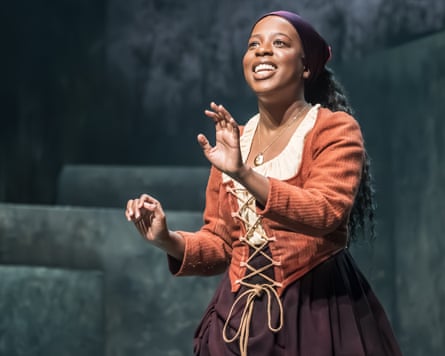Rebecca Brewer and Daisy Chute’s musical, inspired by the Pendle witch trials of the 17th century, clearly seeks to turn the accused women from footnotes in history to flesh and blood beings, outrageously wronged and relaying their own stories.
A group of Lancashire women are awaiting their fates behind bars: the church-going Frances (Shiloh Coke) whose husband is her accuser and who has suffered child loss; heavily pregnant Rose (Lauryn Redding); Maggie (Jacinta Whyte), who makes medicine from herbs; and Nell (Allyson Ava-Brown), a midwife or maid to Frances. The drama kicks off with a newly deposited prisoner, Jenet (Gabrielle Brooks), famed for testifying against her family for witchcraft as a child, who is now accused of the same thing.
There are many potentially powerful strands of story, from the coercion of children to the way in which the poorest, most disempowered women were targeted. But too much is stuffed in and not much of it evokes enough horror. Maybe it is because of the comic tone and cartoonish portrayals, which give it a Blackadder-ish glibness. The production, directed by Miranda Cromwell, feels relentlessly off-key, despite a robust onstage band and strong vocal performances.

It is no fault of the actors. The plot sprawls in unruly ways, with simplistic messages in the book and lyrics about empowerment and historical revisionism. For a while, it seems like an ensemble piece, delving into the worlds of each of these women. It appears to find its focus in Jenet’s psychodrama as we are taken, eccentrically, into her mind with her childhood self played by a puppet.
But once that story is told, it swings in other directions: a scene in which Maggie gives birth and the actors sing about mother earth; a broadly comic enactment of the misogynistic men of history who laid down the foundational ideas that led to the trials; King James I popping up in a ruff collar to give his stamp of approval to the witch-hunts. Slowly the drama becomes more static as it relentlessly charges from one ballad to another.
The ideas are plentiful but they slosh around haphazardly, turning what might have been inspired gig-theatre into a strange soup.
-
At Kiln theatre, London, until 17 January

 2 months ago
76
2 months ago
76

















































